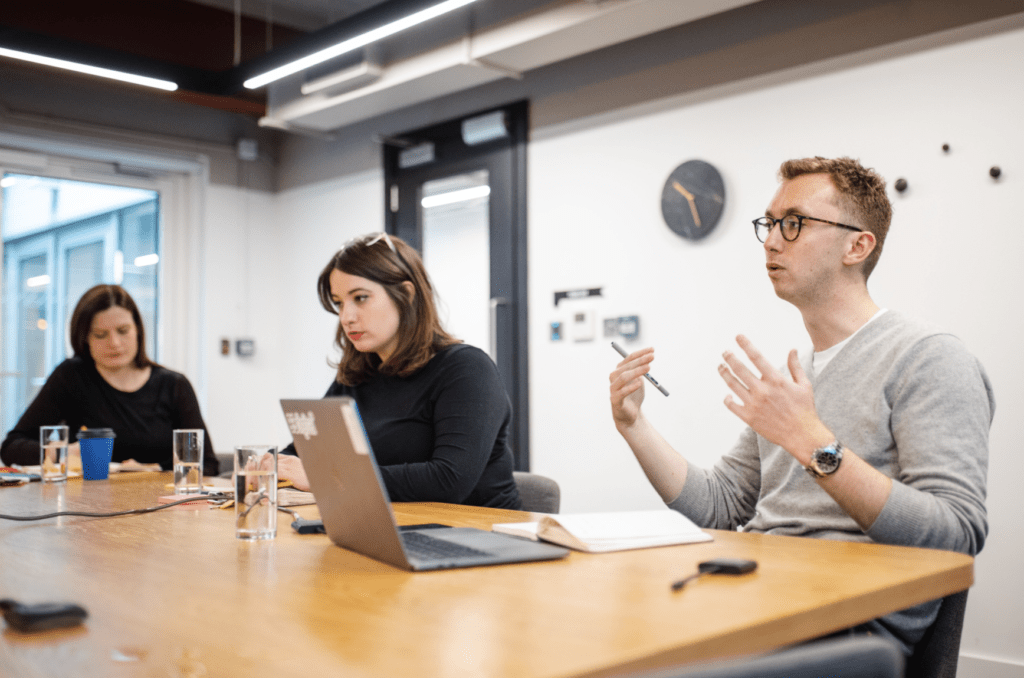FAQs: Working with 93digital
We know that finding the right agency partner can be difficult and time consuming. So we hope that by being transparent with the information below, we can provide some useful guidance that will save you some time in helping to establish if we might be a good fit for you or your project.
If you’re uncertain of anything, feel free to drop us a message – we’re always happy to talk.
What type of projects do you take on?
We only ever take on projects with a strategic outlook – we’re driven by solving problems and seeing the needle move in some way, whether that’s increasing conversions, SEO results, lead generation or any other marketing objective you might be working towards. Our consultative process and strategic approach to projects reflect this.
In terms of industries, we’re most famous for our B2B expertise, delivering the digital experience platforms that sit at the heart of growth for B2B tech/SaaS and B2B services clients.
So if you have some ambitious goals to achieve, we’d love to hear from you!
What budget sizes do you work with?
An entry level website starts from £20k but the majority of our full projects sit between the £45k and £100k range. The cost depends on the finalised scope, requirements, delivery approach and varies from project to project.
Larger and more complex projects can run into the £120k-£200k range.
There are often a number of ways of ‘meeting the brief’ in different budget ranges, with lots of variables that can govern costs, such as the size of the site, complexity of the design, interactivity of the development and any key features, functionality or integrations.
We would recommend you get in touch if you have a brief you would like to explore, and we can share more information on budgets based on past projects we have delivered.
How long do your projects take to deliver?
We typically find our fully bespoke website design and build projects last a minimum of 10 weeks, whilst an average project sits around 14-18 weeks and larger more complex projects delivered in phases could last much longer or be delivered using an iterative approach. It all depends on the finalised scope.
Since we were founded, we have delivered hundreds of website projects and we have timesheets for most of them. Timesheets are what our team use to record what they’re working on each day, and how much time they spend doing specific tasks within each project.
This means we know exactly how many hours of our team’s time have gone into a project, and can forecast timelines for projects of varying scopes very accurately based on historical data.
The biggest unknowns that are hard to forecast for are therefore the ones outside of our control, such as:
- any other dependent work taking place with third parties or internally (e.g. branding, copywriting, CRM) which could impact the website project.
- how much time/dedicated resource our clients have available to commit to the project alongside other projects.
- the total number of and levels of alignment of stakeholders involved in the project.
- how quickly our clients are typically able to provide feedback & sign off on milestones and deliverables, and how many stakeholders would be involved in sign offs.
What’s the best way to brief you?
We always recommend prospective clients invest time in a well written brief, even if it’s just in relation to initial strategy or discovery work.
It means that when you do reach out to potential agencies, you’re able to brief them in the same way and ensure you get proposal responses that you can compare easily because they are based on the same consistent brief.
The better your brief, the better the proposals and responses you can expect to receive back from agencies.
If you’re not sure where to start on a website project brief you can find our brief template download here which should help to guide you on how to structure a good website design and development brief.
How do you qualify projects that are a good fit?
We’re fortunate to generally receive more briefs than we’re able to produce proposals for or take on, so we sometimes have to make tough decisions around which projects we feel are a good fit for us.
These are some of the things we consider before deciding whether we’re able to produce a proposal for a project:
- How many agencies the brief is being shared with.
- Whether there is a past working relationship with any of the agencies.
- Whether the budget is signed off and a good fit relative to the scope.
- Whether the desired delivery timeline is feasible.
- If the client is seeking a partnership focused relationship.
How do you deliver proposals and pitches?
We deliver our proposals in presentation deck form, in person or over a video call screen share, and we request as many project stakeholders as possible are in attendance.
After delivering the presentation, we will then share a PDF copy of the proposal deck and/or a recording of the video call if requested.
We never blind submit written proposals by email without any interaction, as we feel passionately that paragraphs of text on sheets of A4 are a terrible medium for communicating exciting digital projects!
Being able to talk through our proposals with our clients and showcase relevant work and ideas is much easier, effective, interactive, dynamic and engaging for both client and agency. It also gives our clients a chance to ‘meet us’ and get a feel for working with us! We know that great projects are delivered off the back of great working relationships.
How soon can you start a project?
We can typically start a project within 2-6 weeks of confirmation, but we usually have multiple proposals pending and our schedules can change at short notice, so the more notice we have, the sooner we can confirm a start date.
Once we submit a proposal, we always endeavour to keep prospective clients up to date on available start dates and if our schedules change.
Once a project is confirmed, we need to:
- Put in place a signed Master Service Agreement
- Draft the initial Statement of Work (SoW)
- Have the Statement of Work reviewed and signed
- Issue the deposit invoice for the project
- Run an internal team project briefing
- Carry out some pre-kickoff planning and research
- Prepare a client kick off session
There might also be some steps we need our clients to take before we can formally start a project, such as filling out some of our onboarding documents, briefing templates or questionnaires.
All of the steps above can easily take a couple of weeks, but often more if you have legal, procurement or C-Suite sponsors that need to review documents or provide sign off, so it’s worth building this into your timelines.
Do you work with existing ‘off the shelf’ WordPress themes or templates?
No, we only ever deliver bespoke projects that are fully designed and developed from scratch.
Our enterprise clients work with us because they are serious about optimisation on all fronts. This includes speed, security, code quality, scalability, SEO, accessibility etc.
The only way of achieving these things to the level our clients require is through custom WordPress design and development, so all of our websites and WordPress themes are handcrafted from scratch for every client.
Do you take on ad hoc change requests or small projects to existing sites that you didn’t build?
We do sometimes take over retained development, support and maintenance for client’s sites built by another agency. We only take on this kind of work as part of an ongoing monthly retainer that includes retained time, support & maintenance.
To be able to support a WordPress website built by another agency, we would first need to conduct a Technical Audit to explore the site’s codebase and theme. Following this, our support team would then be better placed to advise on a retained support package.
If we built your site originally, we will of course be able to assist with ad hoc projects, change requests, new features or enhancements via our support or project teams.
Do you take on ‘development only’ projects?
Sometimes, but this would be entirely dependent on the brief.
Do you take on white label projects?
No. We’re fortunate that lots of agencies ask us to deliver projects behind the scenes for their clients, but we don’t take on this kind of work. We’re happy to work alongside agencies as a partner, but will always require a direct relationship with the end client.
Do you provide ongoing digital marketing services?
At 93digital we’re focused on delivering award winning digital experiences for our clients, including UX, website design and web development. But our digital performance team over at 93x can help with all of your digital marketing & performance needs, including SEO, PPC, paid social, analytics and content. 93x are the digital performance side to our agency, working our clients after a website launches to drive continued growth. Visit the 93x site at 93x.agency.


